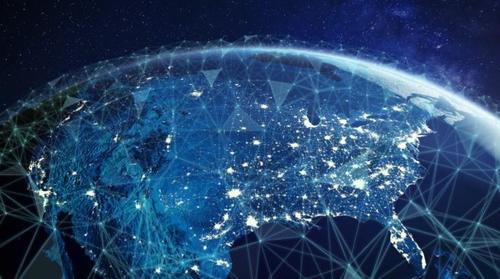Microsoft Claims It Has Found Evidence Of Another Russian-Backed Government Hack
Hackers have made some serious strides in their ability to circumvent corporate system protections in recent years, which is one reason we have seen so many high-profile incidents, including the Colonial Pipeline hack (which further emboldened shadowy criminal groups around the world after the company paid a nearly $5 million ransom). But while the world waits for the US government to hold the shadowy group, known as Darkside, accountable, Microsoft warned in a blog post published Friday morning that it has discovered evidence of another massive government hack that’s already underway.
In a blog post published Friday, Microsoft Vice President Tom Burt said this past week’s attack (which is still ongoing) has granted access to about 3K email accounts at more than 150 organizations by infiltrating a digital marketing service used by the US Agency for International Development (USAID) called Constant Contact.
The hackers distributed phishing emails, among them “Special Alerts,” declaring that former President Trump had published new documents on election fraud, and inviting users to view them.
The hackers that infiltrated software vendor Solarwinds succeeded in what Microsoft described as one of the worst data breaches ever to hit the US government. Now, this new cyberattack has infiltrated more than 150 government agencies, think tanks and other organizations. And according to Microsoft, it was carried out by the same people.
This group, which Microsoft calls “Nobelium” is believed to be linked to the same Russian government agency that backed the Solarwinds attack, though Microsoft didn’t say much about their reasons for arriving at this conclusion.
While there was no ransomware component to the Solarwinds hack, Microsoft said that at least 25% of the targets of this week’s attacks were involved in international development, humanitarian, and human rights work, across at least 24 countries. This suggests the group is more interested in “intelligence gathering efforts” than corporate sabotage.
“These attacks appear to be a continuation of multiple efforts by Nobelium to target government agencies involved in foreign policy as part of intelligence gathering efforts,” the company said.
The US government said last month that SolarWinds was the work of SVR, the Russian foreign intelligence service, and said it also went by the names of APT29, which UK intelligence says spent much of last year hacking foreign governments for vaccine research, and Cozy Bear, which was allegedly involved in the 2016 hack of the DNC.
Read Microsoft’s complete blog post below:
This week we observed cyberattacks by the threat actor Nobelium targeting government agencies, think tanks, consultants, and non-governmental organizations. This wave of attacks targeted approximately 3,000 email accounts at more than 150 different organizations. While organizations in the United States received the largest share of attacks, targeted victims span at least 24 countries. At least a quarter of the targeted organizations were involved in international development, humanitarian, and human rights work. Nobelium, originating from Russia, is the same actor behind the attacks on SolarWinds customers in 2020. These attacks appear to be a continuation of multiple efforts by Nobelium to target government agencies involved in foreign policy as part of intelligence gathering efforts.
Nobelium launched this week’s attacks by gaining access to the Constant Contact account of USAID. Constant Contact is a service used for email marketing. From there, the actor was able to distribute phishing emails that looked authentic but included a link that, when clicked, inserted a malicious file used to distribute a backdoor we call NativeZone. This backdoor could enable a wide range of activities from stealing data to infecting other computers on a network. You can read more about the technical aspects of these attacks in this blog post from the Microsoft Threat Intelligence Center (MSTIC).
Many of the attacks targeting our customers were blocked automatically, and Windows Defender is blocking the malware involved in this attack. We’re also in the process of notifying all of our customers who have been targeted. We detected this attack and identified victims through the ongoing work of the MSTIC team in tracking nation-state actors. We have no reason to believe these attacks involve any exploit against or vulnerability in Microsoft’s products or services.
These attacks are notable for three reasons.
First, when coupled with the attack on SolarWinds, it’s clear that part of Nobelium’s playbook is to gain access to trusted technology providers and infect their customers. By piggybacking on software updates and now mass email providers, Nobelium increases the chances of collateral damage in espionage operations and undermines trust in the technology ecosystem.
Second, perhaps unsurprisingly, Nobelium’s activities and that of similar actors tend to track with issues of concern to the country from which they are operating. This time Nobelium targeted many humanitarian and human rights organizations. At the height of the Covid-19 pandemic, Russian actor Strontium targeted healthcare organizations involved in vaccines. In 2019, Strontium targeted sporting and anti-doping organizations. And we’ve previously disclosed activity by Strontium and other actors targeting major elections in the U.S. and elsewhere. This is yet another example of how cyberattacks have become the tool of choice for a growing number of nation-states to accomplish a wide variety of political objectives, with the focus of these attacks by Nobelium on human rights and humanitarian organizations.
Third, nation-state cyberattacks aren’t slowing. We need clear rules governing nation-state conduct in cyberspace and clear expectations of the consequences for violation of those rules. We must continue to rally around progress made by the Paris Call for Trust and Security in Cyberspace, and more widely adopt the recommendations of the Cybersecurity Tech Accord, and the CyberPeace Institute. But, we need to do more. Microsoft will continue to work with willing governments and the private sector to advance the cause of digital peace.
Tyler Durden
Fri, 05/28/2021 – 08:10
via ZeroHedge News https://ift.tt/3oY5MDm Tyler Durden
